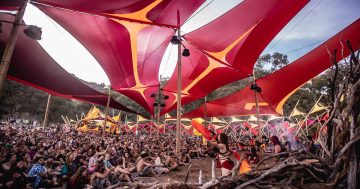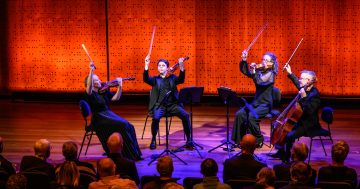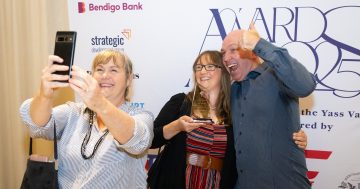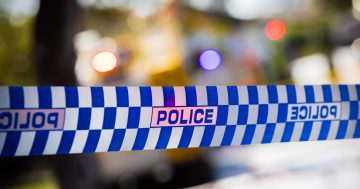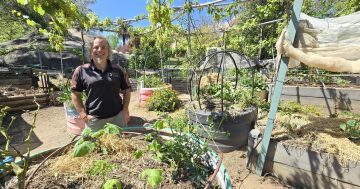
The tranquil Wee Jasper valley is the setting for the Dragon Dreaming festival. Image: Peter Niven, Facebook.
Dragon Dreaming organisers say they’re among many smaller festivals whose ongoing existence is threatened by harsh new regulatory requirements. They’re asking whether the NSW government’s political agenda and entrenched attitudes are more to blame than genuinely heightened risks.
The Wee Jasper event has endured ongoing criticism around drug and safety issues. Last year police laid 49 drug-related charges and in 2015, a woman died at the event after taking the highly toxic drug methylone.
Organisers have never talked to the media. But after being forced to postpone this year’s Festival, they’re speaking out.
“It’s important to acknowledge that any public event is risky. You can’t eliminate that,” they told Region Media. “You put processes and procedures in place to manage risks.
“The problem with the current NSW legislation is that it was designed without input from festival organisers.
“The NSW government responded to perceived issues by using parties, including police, to institute a compliance response. Unfortunately, in not consulting festival organisers, they’ve misunderstood what the risks actually are.”
The Dragon Dreaming committee says that festival deaths constitute around 0.5 per cent of all drug-related fatalities. They say they’ve carefully considered risk mitigation strategies and have approached Yass police “multiple times” with a proactive stance on drug issues.
Among those strategies are substance testing inside the event and amnesty bins outside, where people can dump pills before police checks.
But organisers say that they need police and regulators on board with the education and information approach.
“Zero tolerance was originally best practice but that’s shifted a lot. We know from overseas evidence that focusing on harm reduction supports people to make better choices.
“We’re not saying drugs are great or you’ll be safe, but people take drugs because they enjoy the experience, so zero tolerance won’t work.
“Pill testing is often their first chance to get help. It’s the first intervention people will have had in their drug-taking.”
Risk assessment levels imposed by the NSW government mean Dragon Dreaming is required to have a police presence on a user-pays model. But organisers say that wildly varying fees make budgeting almost impossible.
Dragon Dreaming has spent $215,000 in recent years on policing and claims that in that time, costs have varied between $14,000 to $60,000. The Hume Local Area Command has the discretion to set charges.
Organisers claim that while they submit support requests mid-year, they often don’t receive a response until just before the November date, leaving no time to negotiate on costs without risking cancellation.
While legislation mandates the use of police and emergency services, it doesn’t set guidelines for calculating them.
“You can’t look at legislation and say that 5000 people will require four ambulances at $4000 each and 50 police at $1000. Individual officers negotiate numbers and costs, and the political environment means negotiations are subject to last-minute changes,” they say.
After the 2015 death of a 23-year-old Sydney woman, the Festival reviewed all safety procedures. In addition to police and private security, they have paramedics and emergency doctors on-site and a security liaison volunteer who is a former police officer.
Dragon Dreaming engages Dancewize NSW peer volunteers to give harm reduction information and peer support to people who use drugs at festivals.
Dragon Dreaming says that relationships with Wee Jasper locals and Yass Valley Council are strong, while the Hume Local Area Command discussion has been “robust” at times – in their first year at Wee Jasper, some police arrived wearing riot gear.
Organisers are arguing for police to see Dragon Dreaming as a trust-building community relations operation.
“We certainly see individual officers embracing the spirit of the event. But in the current regulatory-based environment, young people don’t feel safe going to the police. That removes a huge possible ally in their own safety.”
Committee members say that they’re not alone in wanting to build trust-based relationships.
“These laws are based on fear. We want regulation, we welcome it, but the process must be transparent. Give us some planning and structure and some input into developing robust policy, because we’re business operators at the end of the day.
“We are not a fly-by-night group. We’ve built our event from 200 to 5000 people and our budget from $10,000 to almost $1 million. We buy local services wherever we can and we contribute $2.5 million to the Yass economy. We have invested $200,000 on the roads alone to ensure safe access.
“We’d give it all up if we believed that what they were saying about our festival was true, but it’s not true. We’ve kept our thoughts to ourselves in the past, but it’s time for this conversation to be brought out into the public sphere.”
Original Article published by Genevieve Jacobs on The RiotACT.







